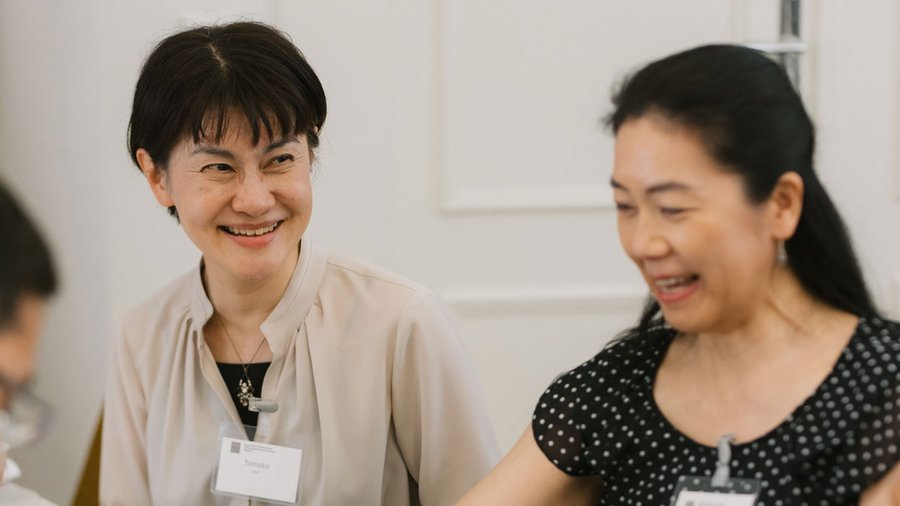Tomoko Imai on her work in education focusing on international collaboration, social and emotional learning and her expectations from the Salzburg Global program
This interview was conducted prior to Salzburg Global's Japan-India Transformative Technology Network in-person program in June 2023.
Tomoko Imai is a product designer and education enthusiast and is a Fellow of the 2023 Japan-India Transformative Technology Network program. Tomoko is currently the director of Education at Jiyugaoka Gakuen High School, where she is responsible for designing, developing, and implementing programs on the future of education, with a particular focus on social and emotional learning, STEAM education, and international collaboration. Tomoko is passionate about revolutionizing the future of education by incorporating technology and visual tools to promote social, intercultural, and emotional skills. She shared her motivation and vision of the Japan-India Transformative Technology Network program with us.
Madhumitha Srinivasamoorthy, Impact Fellow, Salzburg Global Seminar: Can you tell me about yourself, your work, and how your work is related to Japan, India, and technology?
Tomoko Imai: I am now designing a high school program at a Japanese high school. I'm developing a new curriculum for Japanese kids. I was an engineer, and I had been doing research in virtual reality. I went to the University of Illinois at Chicago, and there I researched collaborative virtual reality. I really enjoyed collaborating with diverse people in the US and found it significantly lacking in the Japanese education system.
I spent some time working on User research and User experience at a tech company in Japan in collaboration with researchers in Europe. However, I was still very interested in contributing to the educational experience in Japan – to expand the international and emotional learning of students by providing multicultural collaboration opportunities. Therefore, I undertook this project to develop an international network so that students can collaborate online. While my project began with Zoom, I'm thinking of using much more sophisticated technology so that students can work on content rather than language. So maybe, I want to use Artificial Intelligence, virtual reality or augmented reality if students can start a project. This is a starting point of my endeavor. I am currently in conversation with teachers in India. In the next academic year, teachers from Bombay International School and us- we are going to meet over Zoom and see what we need as a tickler for technology so that students using different languages and different cultural backgrounds can work together.
MS: Why did you join the Japan-India Transformative Technology Network, and what are your expectations from the program?
TI: So far, my network for international collaboration has been through my friends and colleagues. I started to feel a limitation in the network I could build. When I came across the Japan-India Transformative Technology Network, I realized that this is a real global network that could help me expand on my idea. Regarding my expectation, in the first year, I want to observe what we need by collaborating with international students. And after that, if we find out necessary technologies or support, we want to develop infrastructure for students so that students can continue to work on their own projects seamlessly with different students in different countries. And I want to provide infrastructure for students in different worlds, in Australia, Africa, and in different countries, can communicate with each other.
MS: How do you like the platform so far? Do you already see potential avenues of collaboration with the network?
TI: The people in the network are so intuitive to discuss, kind and positive. I really like the people there. They are so interesting to talk with and discuss about the future. There are many Fellows across disciplines in Japan already. I have met a few Fellows already, and we plan to meet a few more in Tokyo before we fly to Salzburg.
MS: Are you looking forward to the in-person program in Salzburg?
TI: What excites me about coming to Salzburg is that I can take up the discussions face to face and actually draw a path on how to commence collaborations. I am expecting innovative ideas. We can gather ideas from different people to get further support from people in different domains, especially engineers, to develop good infrastructure for international students.
I'm expecting that when we start developing this infrastructure, this will be distributed over different countries and continue to be used for more than ten years. And students can discuss, for example, peace and happiness. Students and young children have a good idea about how to make this work better, but their opinions are often neglected. I hope that the infrastructure we build enables listening to their voices and paying heed to their desires. On matters such as war – we know that nobody wants to do it. Suppose the kids and parents have power. I think we can do something better than staying there and suffering from big powers. That is my ambition, and I am looking forward to Salzburg.
Since coming to Salzburg in June 2023, Tomoko has been working alongside other Salzburg Global Fellows on a project centered around the theme of inclusion. Her team is working on a project titled "Inclusive Communication, Education, and Empowerment in the AI Era".


